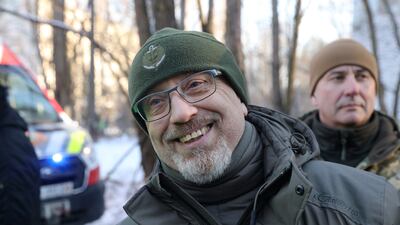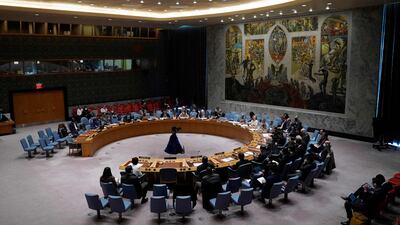Live updates: follow the latest news on Russia-Ukraine
The defence minister leading Ukraine’s resistance against the Russian invasion is a former lawyer and ex-Soviet paratrooper who once helped to overturn a disputed presidential election victory by a Kremlin-friendly candidate.
Appointed only four months ago, Oleksii Reznikov has used his prominent role to publicise harrowing accounts of alleged Russian atrocities in Ukraine and to rally the country’s population to resist the onslaught.
Like President Volodymyr Zelenskyy, he has lobbied European politicians to back up their warm words towards Ukraine with more military aid to help fend off Russia’s tanks, including in addresses to a Nato summit on Wednesday and the European Parliament on Thursday.
“Now is the time of trials for our generations. And we are passing them with dignity,” he said in a rallying cry to Ukraine’s people this week.
Mr Reznikov, who is 55 and was born in Lviv in western Ukraine, spent two years in the 1980s serving in the Airborne Parachute Troops of what was then the Soviet air force, and is known to be an amateur skier and scuba diver.
After leaving the military, he completed a law degree in Lviv that would later throw him into the heart of a political crisis in post-Soviet Ukraine.
A contentious presidential vote in 2004 saw Russia-friendly candidate Viktor Yanukovych narrowly defeat opposition leader Viktor Yushchenko, who claimed he was poisoned during a campaign marred by claims of intimidation.
The result led to protests and was ultimately annulled by Ukraine’s Supreme Court in a case successfully argued by Mr Reznikov, leading to a re-run which was won by Mr Yushchenko.
After moving into politics, Mr Reznikov was a senior official in the Kyiv city government and represented Ukraine on a delegation of regional authorities to the Council of Europe.
When Mr Zelenskyy came to power in 2019, he appointed Mr Reznikov as a negotiator in Ukraine’s sensitive talks with Russia, France and Germany, a four-way grouping known as the Normandy format.
Mr Reznikov, later named deputy prime minister, claimed success in agreeing a ceasefire in the disputed Donbass region in eastern Ukraine, but accused Russia of lacking willingness to end the war and the truce ultimately failed to hold.
The Normandy format and the associated Minsk peace accords were meant to find a negotiated solution to the conflict but both sides accused each other of failing to implement them.
By the time Mr Reznikov was moved to the defence ministry in November 2021, Russia was starting to amass troops on Ukraine’s border in a build-up that sent tension spiralling again.
Like Mr Zelenskyy and other top officials, Mr Reznikov sought to calm fears of an invasion and told Ukraine’s population as late as early February that there was no need to pack suitcases or flee the country.
But once Russia did invade on February 24, he was thrust into the role of organising Ukraine’s resistance and told Russian forces as they began losing tanks and aircraft: “Welcome to hell.”
In near-daily updates he has spoken of his outrage at Russia’s onslaught and his pride in a Ukrainian resistance which western officials say has succeeded in slowing down the invasion.
Burning enemy helicopters and funerals for Russian soldiers were a “demonstration of what is now happening to the occupying forces,” he said in an address on Wednesday.
“Many challenges still lie ahead,” he said. “The enemy will hurt us, destroy a part of the things we love. But every day we are taking a step to crush this enemy and live freely.”
































